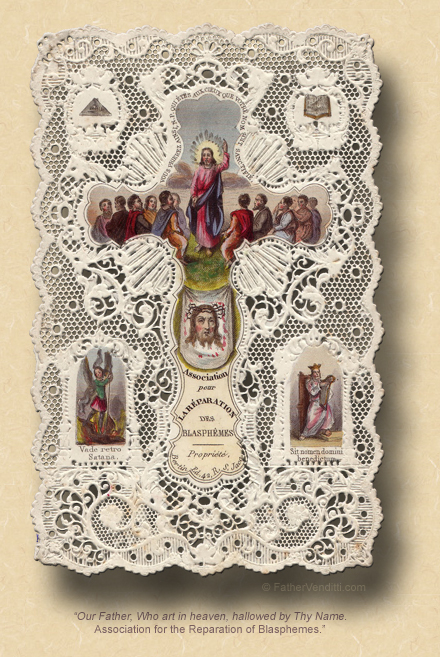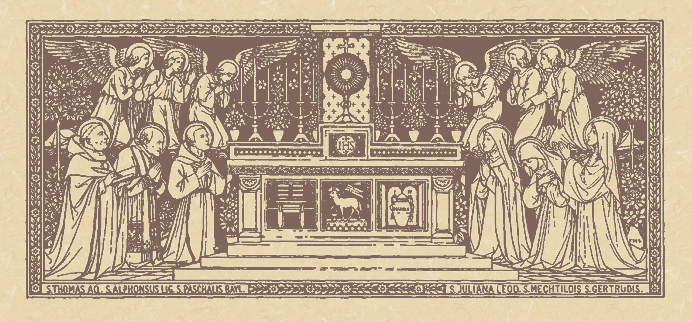Lord, Teach Us to Pray.
In the United States: The Eleventh Thursday of Ordinary Time.
Lessons from the primary feria, according to the ordinary form of the Roman Rite:
• II Corinthians 11: 1-11.
• Psalm 111L 1-4, 7-8.
• Matthew 6: 7-15.
|
Outside the United States:
The Solemnity of the Most Holy Body and Blood of Christ.
Lessons from the tertiary proper, according to the ordinary form of the Roman Rite:
• Genesis 14: 18-20.
• Psalm 110: 1-4.
• I Corinthians 11: 23-26.
• [Optional Sequence] Lauda Sion …*
• Luke 9: 11-17.
|
The First Class Feast of Corpus Christi.
Lessons from the proper, according to the extraordinary form of the Roman Rite:
• I Corinthians 11: 23-29.
• Psalm 144: 15-16.
• [Sequence] Lauda Sion …*
• John 6: 56-59.
FatherVenditti.com
|
 6:36 AM 6/20/2019 — In the Gospel lessons all this week, our Lord has been treating the subject of prayer. There's all different kinds of prayer, as you know, depending on the method or the subject matter or both: vocal prayer verses mental prayer, prayer of petition verses prayer of thanksgiving, liturgical prayer verses private prayer, centering prayer verses the prayer of the presence of God. Our Lord today focuses on private vocal prayer, and the example He gives is a prayer of petition: the Our Father, which we call the Lord's Prayer because it was given to us by our Lord. Even though it's being presented by our Lord as an example of private prayer, it's become an example of liturgical prayer as well, as it soon became part of the liturgy of the Church, and was already at the time the Gospels were written. Matthew’s form of the Our Father, which we read today, follows the liturgical tradition of his Church; Luke’s shorter, less developed version represents the liturgical tradition known to him, and is probably closer than Matthew’s to the original words of Jesus. 6:36 AM 6/20/2019 — In the Gospel lessons all this week, our Lord has been treating the subject of prayer. There's all different kinds of prayer, as you know, depending on the method or the subject matter or both: vocal prayer verses mental prayer, prayer of petition verses prayer of thanksgiving, liturgical prayer verses private prayer, centering prayer verses the prayer of the presence of God. Our Lord today focuses on private vocal prayer, and the example He gives is a prayer of petition: the Our Father, which we call the Lord's Prayer because it was given to us by our Lord. Even though it's being presented by our Lord as an example of private prayer, it's become an example of liturgical prayer as well, as it soon became part of the liturgy of the Church, and was already at the time the Gospels were written. Matthew’s form of the Our Father, which we read today, follows the liturgical tradition of his Church; Luke’s shorter, less developed version represents the liturgical tradition known to him, and is probably closer than Matthew’s to the original words of Jesus.
Down through the centuries a lot of people have composed meditations on the petitions of Lord's Prayer, and I'm not going to try to add to what's already available;—certainly not in a short ferial day homily—but, there are a couple of things that could stand to be mentioned based on what is often brought up in confession, and they have to do more with what our Lord says in introducing His prayer rather than with the prayer itself: “In praying, do not babble like the pagans, who think that they will be heard because of their many words. Do not be like them. Your Father knows what you need before you ask him” (Matt. 6: 7-8 NABRE). And in that very simple instruction there are two extremely important points.
The first is that our prayers are not better for being verbose. I've mentioned before, I think, the episode from the life of Saint John Vianney in which the saintly priest spied a man visiting the Blessed Sacrament every day for a considerable length of time, but never seeming to use any kind of aid in his prayer: he never had a Rosary with him, never used any kind of prayer book. And when the Curé of Ars asked him what he did in the presence of our Lord, he responded by saying, “I look at Him and He looks at me.” So, the first point our Lord makes here is that our prayers are no better for containing a multiplicity of words. That's simple enough.
His second point, through, is a bit more mystical, in that he explains that any prayer of petition is an exercise in the obvious, given the fact that God already knows what we need and what we want: “Your Father knows what you need before you ask him,” He says (v. 8). It begs the question: Why ask at all, then? Clearly, He's not suggesting that we don't, otherwise He wouldn't have given us the prayer; but, putting our needs into words requires that we first clarify them in our own minds; and, in the process, we force ourselves to come to terms with the tension between what we need—or, to put it more precisely, what we've convinced ourselves we think we need—and what may or may not be God's will for us. The substratum of every prayer is the desire for the grace to accept the Will of God in all things, even when His Will is not our own; and, this is, in fact, explicitly included in our Lord's Prayer: “Thy kingdom come, Thy will be done ….”  This is the reason I usually omit the petitions at daily Mass or, when I do them, use a set formula that never varies, just to emphasize the fact that it's not our place to be telling God what we think He should be doing; worse yet when the petitions are used to make social commentary, or serve as an expression of cultural diversity. I'm always disturbed, whenever I attend diocesan functions and someone has decided that there must be fifteen petitions, each read in a different language by representatives of every ethnic group lurking in the remotest corners of the diocese. That's not what the Bidding Prayers are for, and that's not prayer. This is the reason I usually omit the petitions at daily Mass or, when I do them, use a set formula that never varies, just to emphasize the fact that it's not our place to be telling God what we think He should be doing; worse yet when the petitions are used to make social commentary, or serve as an expression of cultural diversity. I'm always disturbed, whenever I attend diocesan functions and someone has decided that there must be fifteen petitions, each read in a different language by representatives of every ethnic group lurking in the remotest corners of the diocese. That's not what the Bidding Prayers are for, and that's not prayer.
But the most important lesson of all, I think, stems not from any specific thing our Lord says here, but rather the very fact that, in response to the disciples' question about how they should pray, He doesn't then give them a lesson about prayer; He gives them a prayer, and a very specific one which is being quoted here word for word. And this is something one hears in confession quite frequently, when people seem distressed over the fact that they feel their prayer is dry and empty because it's not offering them any kind of emotional or psychological consolation. Notice that our Lord does not say, “Use these words, and you'll feel better.” He just says, “Say this.” He doesn't indicate that anything is supposed to happen to us in the process. Prayer—at least as it's being presented to us here by our Lord—is not meant to be therapeutic. We don't pray to “get something out of it,” just as we don't assist at Holy Mass to “get something out of it.” We assist at Mass because it is the re-presentation of our Lord's sacrifice on the Cross making present to us—and offering us—His most Sacred Body and Precious Blood. Just like we don't go to confession to receive counseling, but to speak our sins out loud to our Lord and receive His absolution. Just like we don't baptize a child to welcome him into the community, but to cleanse him of original sin and restore Sanctifying Grace. Just like we don't conduct funerals as some form of liturgical grief counseling for the bereaved, but to speed the soul on its journey and keep it safe until the final resurrection. This notion that every spiritual thing we do as a Church, both publicly and privately, has to have some therapeutic result is based in a lack of faith. More to the point of today's Gospel lesson: we don't pray because we're feeling down and think that by praying we will feel better. If that should happen, all well and good, and it is always a great grace if our Lord causes that to happen. But the reason we pray is that Jesus is God, and He has commanded it of us, and even gave us a prayer to say.
The irony is that, when we disabuse ourselves of this notion that our spiritual exercises are supposed to have some therapeutic benefit, they often end up having such because they serve to strip away the sin of pride and dispose us to God's Holy Will. Saint Augustine said that the petitions of the Lord's Prayer comprise everything that man could possibly ask of God (cf. Sermon 56), not so much because it asks for our daily bread or forgiveness of our sins, but primarily because it asks for God's Will to be done. Prayer only accomplishes what our Lord intends when we have dis-enthralled ourselves from the process.

* Regard the post for this coming Sunday for a translation of the sequence.
|

